
OPTICS AND SPECTROSCOPY
metrics 2024
Fostering Excellence in Optical Science and Engineering
Introduction
Optics and Spectroscopy is a pivotal peer-reviewed journal published by Pleiades Publishing Inc, focusing on the intricate fields of atomic and molecular physics, as well as optics. Established in 1972, and enjoying a legacy of convergence periods that reinforce its commitment to the evolving landscape of these scientific domains, the journal aims to disseminate high-quality research that advances our understanding of light-matter interactions, electronic materials, and spectroscopic techniques. Despite its current Q4 categorization in both the Atomic and Molecular Physics and Electronic, Optical and Magnetic Materials fields, with corresponding Scopus rankings reflecting its developing influence, the journal remains a valuable resource for researchers and professionals seeking to publish their findings, explore new methodologies, and connect with a community dedicated to innovation in optics. Although there is currently no open access option, the journal's expansive readership and its stability in publication over the decades make it an important platform for both established and emerging researchers in the field.
Metrics 2024
 0.18
0.18 0.80
0.80 0.70
0.70 44
44Metrics History
Rank 2024
Scopus
IF (Web Of Science)
JCI (Web Of Science)
Quartile History
Similar Journals

Plasmonics
Catalyzing Interdisciplinary Discoveries in PlasmonicsPlasmonics, published by Springer, is a prestigious journal dedicated to advancing the field of plasmonics and its interdisciplinary applications, with a particular focus on biochemistry, biophysics, biotechnology, and nanoscience. Established in 2006, this peer-reviewed journal serves as a vital platform for researchers to disseminate groundbreaking findings and innovative methodologies related to the manipulation and application of surface plasmons for various technologies. Featuring an impressive Q3 ranking in critical scientific categories, including Biochemistry and Nanotechnology, Plasmonics is recognized for its contribution to enhancing the understanding of nanoscale phenomena and their relevance to contemporary research and development. While currently not an open-access publication, Plasmonics continues to play a key role in bridging academic inquiry and practical application, making it indispensable for professionals and students striving to stay at the forefront of this dynamic field.
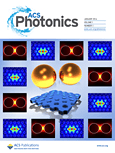
ACS Photonics
Exploring the Intersection of Science and TechnologyACS Photonics, published by the American Chemical Society, is a leading journal dedicated to advancing the interdisciplinary fields of photonics and optics. Since its inception in 2014, the journal has swiftly established itself as a premier platform for the dissemination of groundbreaking research, achieving a distinguished Q1 ranking across several categories including Atomic and Molecular Physics, Biotechnology, Electrical and Electronic Engineering, and Electronic, Optical and Magnetic Materials. With an impressive Scopus Rank and notable percentiles—ranking 19th in Atomic and Molecular Physics and 32nd in Biotechnology—the journal continues to shape the dialogue surrounding innovations in laser technology, optical materials, and biophotonic applications. While the journal does not currently offer open access options, it remains a vital resource for researchers, professionals, and students seeking to explore the cutting-edge developments in this dynamic field. Located in Washington, DC, ACS Photonics is committed to bridging theoretical insights with practical applications, making significant contributions to science and technology.
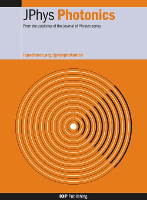
Journal of Physics-Photonics
Fostering Collaboration in the World of PhotonicsJournal of Physics-Photonics, published by IOP Publishing Ltd in the United Kingdom, is an esteemed Open Access journal that has been at the forefront of research in the field of photonics since its inception in 2018. With an impressive portfolio, the journal has achieved Q1 ranking in 2023 across multiple disciplines, including Atomic and Molecular Physics, Electrical and Electronic Engineering, and Electronic, Optical, and Magnetic Materials. This positions it among the leading journals in these areas, reflecting its significant influence and contribution to advancing knowledge and innovation. The journal aims to disseminate high-quality research findings that encompass a wide range of topics in photonics, promoting interdisciplinary approach that fosters collaboration among researchers, professionals, and students. With its commitment to open access, Journal of Physics-Photonics ensures that groundbreaking research is accessible to all, empowering a global audience to engage with and benefit from the latest advancements in photonic technologies.

ZEITSCHRIFT FUR NATURFORSCHUNG SECTION A-A JOURNAL OF PHYSICAL SCIENCES
Connecting Disciplines through Rigorous ResearchZEITSCHRIFT FUR NATURFORSCHUNG SECTION A - A JOURNAL OF PHYSICAL SCIENCES is a distinguished journal published by Walter de Gruyter GmbH, based in Germany, that serves as a vital platform for research in the realms of mathematical physics, physical and theoretical chemistry, and broader disciplines within physics and astronomy. Established in 1946, this journal has been a cornerstone for scientists and researchers, providing rigorous peer-reviewed articles that push the boundaries of knowledge in physical sciences. With a notable 2023 Scopus ranking reflecting its respected position in the field—Q3 in mathematical physics, physical and theoretical chemistry, and miscellaneous physics and astronomy—this journal not only emphasizes high-quality research but also enhances the visibility and impact of contributions within these areas. Although it does not currently offer open access, the insights shared in its pages are invaluable for advancing academic inquiry and sparking interdisciplinary collaborations. As it looks ahead to 2024, ZEITSCHRIFT FUR NATURFORSCHUNG SECTION A continues to invite contributions that align with its mission to foster an understanding of complex physical phenomena, making it an essential resource for academics, professionals, and students alike.
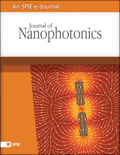
Journal of Nanophotonics
Illuminating the Future of NanotechnologyThe Journal of Nanophotonics, published by SPIE-SOC Photo-Optical Instrumentation Engineers, is an esteemed platform dedicated to advancing the field of nanotechnology through pioneering research in photonics. Since its inception in 2007, this journal has become instrumental in disseminating innovative findings and fostering collaborative discussions, especially in the domains of Condensed Matter Physics, Electronic, Optical and Magnetic Materials, and Nanoscience and Nanotechnology. Currently ranked within the Q3 category across these fields, it serves as a vital resource for academics, industry professionals, and students keen on exploring the multifaceted applications and implications of nanophotonic technologies. With its convergence set to continue until 2024, the journal offers a non-open-access model, ensuring rigorous peer-review standards and high-quality publications that contribute to the global body of knowledge.
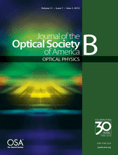
JOURNAL OF THE OPTICAL SOCIETY OF AMERICA B-OPTICAL PHYSICS
Connecting Researchers to the Heart of Optical ScienceJOURNAL OF THE OPTICAL SOCIETY OF AMERICA B-OPTICAL PHYSICS, published by Optica Publishing Group, serves as a leading platform for groundbreaking research in the fields of optical physics, atomic and molecular physics, and statistical and nonlinear physics. With an ISSN of 0740-3224 and an E-ISSN of 1520-8540, this esteemed journal has been in circulation since 1984 and is dedicated to advancing the understanding of optical phenomena and related technologies. It holds a commendable position in the academic community, with a 2023 Scopus ranking reflecting its significance—placing it in the top quartile for both Atomic and Molecular Physics and Statistical and Nonlinear Physics. Although it is not an open-access publication, it provides extensive access options to ensure that research is disseminated effectively within the scientific community. This journal is instrumental for researchers, professionals, and students alike, aiming to keep them informed of the latest advancements and trends in optical science. With a convergence of expertise and innovation, JOSA B continues to play a pivotal role in shaping the future of optical research.

Photonics
Fostering Collaboration in Cutting-Edge OpticsPhotonics, an esteemed journal published by MDPI, is a leading platform for researchers in the fields of atomic and molecular physics, optics, and instrumentation. Since its inception in 2014, the journal has fostered open access to cutting-edge research, facilitating knowledge dissemination in these dynamic disciplines. With its Q2 ranking in the 2023 Scopus metrics for various categories, including radiology, nuclear medicine, and imaging, Photonics represents a crucial academic resource for professionals and students seeking to advance their understanding and expertise. Located in Basel, Switzerland, the journal plays a pivotal role in bridging theoretical and practical approaches to photonic technologies. Researchers are encouraged to contribute their findings, thereby enriching the journal’s impact and relevance in the global scientific community through collaboration and innovation.

Advanced Photonics Research
Connecting Ideas, Transforming TechnologiesAdvanced Photonics Research is a leading open-access journal published by WILEY, dedicated to advancing the field of photonics through rigorous research and comprehensive reviews. With its ISSN 2699-9293, the journal aims to disseminate innovative findings in areas such as photonic materials, devices, systems, and applications. Since transitioning to an Open Access model in 2020, it has significantly increased accessibility for researchers, professionals, and students alike, promoting wider dissemination and collaboration within the global photonics community. The journal's commitment to high-quality, peer-reviewed content ensures it remains an essential resource for those seeking to stay at the forefront of photonics research. Positioned to influence both academia and industry, Advanced Photonics Research is an invaluable platform for sharing cutting-edge discoveries that drive the future of technology.
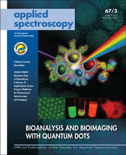
APPLIED SPECTROSCOPY
Catalyzing Insights in Spectroscopy and BeyondApplied Spectroscopy, published by SAGE Publications Inc, is a leading journal in the field of spectroscopy and instrumentation, with a legacy dating back to 1970. This esteemed journal, recognized within the Q2 category for both Instrumentation and Spectroscopy in 2023, provides critical insights and advancements that cater to a wide audience of researchers, professionals, and students. With its Scopus rankings placing it in the top 20% of publications in its respective fields, Applied Spectroscopy stands out for its rigorous peer-reviewed content that drives innovation in analytical techniques and applications. Though not an open-access publication, readers can access a wealth of research articles, reviews, and experimental findings that enrich the scientific discourse in spectroscopy. With a focus on enhancing the understanding and practical applications of spectroscopy, this journal is an essential resource for anyone engaged in this dynamic and evolving discipline.

Optica Pura y Aplicada
Transforming Ideas into Optical AdvancementsOptica Pura y Aplicada, published by the SOC ESPANOLA OPTICA, stands as a vital platform for the dissemination of cutting-edge research in the fields of Atomic and Molecular Physics, Optics, and related engineering disciplines. Established in Spain, this journal aims to foster the advancement of knowledge in optical science and technology by providing a rigorous peer-reviewed publication outlet for scholars, researchers, and practitioners. Despite being categorized in the Q4 quartile across multiple domains, including Engineering and Materials Science, the journal remains committed to contributing meaningful insights and advancements within its scope. With an ISSN of 0030-3917 and an E-ISSN of 2171-8814, the journal effectively reaches a global audience eager to explore innovative applications and theoretical developments in optics and materials science. Researchers and professionals alike will find in Optica Pura y Aplicada a valuable resource for enriching their understanding and practices in an ever-evolving field, fostering collaborations and promoting research growth until its converged conclusion in 2024.